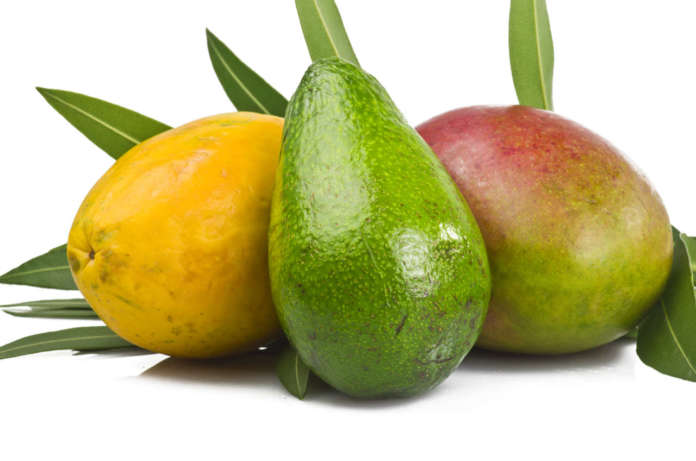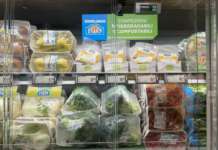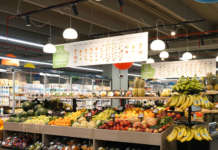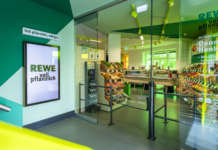Il reparto ortofrutta è un osservatorio privilegiato per capire le nuove tendenze alimentari e gli stili di vita emergenti. Nel contesto genreale di contrazione di consumi dell’ortofrutta, la frutta esotica va in controtenddenza: i dati parlano di volumi in aumento del 29% dal 2017 ad oggi, con la domanda che cresce del 4,5%. Una crescita che ha riguardato in particolare due prodotti: avocado e mango. Il successo delle due referenze sui banchi di vendita è testimoniato dalla significativa progressione delle importazioni e dalla crescita degli investimenti nel Sud d’Italia, che nonostante gli sforzi e gli investimenti degli ultimi anni si traduce ancora in un’offerta limitata e poco strutturata. Per quanto apprezzato, il mercato della frutta esotica made in Italy è circoscritto ad un mercato online e di nicchia e risulta imitato in termini quantitativi a determinati periodi dell’anno. La fascia premium degli scaffali della gdo rimane fedele al prodotto importato che garantisce quantitativi e continuità.
LA PRODUZIONE MONDIALE DI FRUTTA ESOTICA
Nel mondo la coltivazione e la produzione di frutta esotica è in notevole crescita. Secondo i dati diffusi dalla Fao le quantità prodotte corrispondono a 364 milioni di tonnellate, con una crescita del 9% rispetto al 2017. Analizzando nel dettaglio il quantitativo, in testa troviamo banane e platani con una percentuale del 45% della produzione totale, a cui fanno seguito cocco con il 17%, mango e mangostani con il 15%, ananas 8%, papaya 4% ed al 2% datteri ed avocado.
Per quanto riguarda quest’ultimo, nella top 10 delle nazioni produttrici troviamo il Messico che, con quasi 2,4 milioni di tonnellate ricopre il 29% delle quantità mondiali, Colombia 10,7% (il paese più performante), Repubblica Dominicana 8,3%, Perù 8,1%, Indonesia 7,4%, Kenya 3,9%, Brasile 3,3%, Etiopia 3%, Haiti 2,3%, Stati Uniti 2,3% che puntano a tornare sopra le 200 mila tonnellate.
Nel contesto globale, per la produzione di avocado, l’Europa incide con 127 mila tonnellate, con la produzione spagnola al diciassettesimo posto a livello mondiale con quasi 100 mila tonnellate, a cui segue il Portogallo a 16 mila tonnellate, la Grecia con 9.570 tonnellate e, infine, Francia e Cipro. Secondo gli ultimi dati diffusi da Ismea-Niq sulle abitudini di acquisto delle famiglie, una su quattro acquista almeno una volta all’anno l’avocado rilevando un tasso di penetrazione del 25%. Il mango si attesta su un livello leggermente inferiore, coinvolgendo una famiglia su cinque. Il successo dei due prodotti è testimoniato dalla significativa progressione delle importazioni e dalla crescita degli investimenti nel Sud d’Italia che però, come detto, rimane ancora limitata.
A livello geografico, la percentuale di penetrazione è più alta nelle regioni del Centro e del Nord-Est, seguite da quelle del Nord-Ovest, mentre al Sud risulta molto bassa.
La ripartizione degli acquisti per canale vede la gdo concentrare il 95% degli acquisti e il 94% della spesa. I discount sono il primo canale (39% gli acquisti e 33% la spesa), seguiti dai super (31% gli acquisti e 35% la spesa). A livello nazionale, il dato medio di acquisto annuo per famiglia di avocado è di 534 grammi, più alto nelle regioni del Nord-Est (644 grammi) e del Nord-Ovest (626 grammi) e inferiore nelle regioni del Sud Italia (334 grammi).
Le vendite hanno riguardato la fascia familiare 35-54 anni, spesso con figli adolescenti.
I PLAYER VALORIZZANO INFORMAZIONI, PACKAGING E TRASFORMATI
Dole Italia, azienda di produzione e distribuzione di frutta fresca di qualità premium, ha annunciato il lancio della nuova linea di frutta esotica composta da un’ampia offerta di prodotti a marchio Dole -mango, avocado, papaya, frutto della passione, lime e zenzero- finalizzati a soddisfare le esigenze e i gusti più raffinati dei consumatori moderni. Nello specifico la nuova linea esotica Dole è composta da due referenze ready-to-eat, mango e avocado con etichetta Ean apposta sul singolo frutto, e sei referenze in vassoio flow pack di mango, avocado, papaya, frutto della passione, lime e zenzero. Una proposta amplia e completa, finalizzata a intercettare pubblici diversi: le prime due referenze, un consumatore alla ricerca di un convenient food, un prodotto pronto da mangiare, facile e veloce da acquistare negli store grazie alla vendita a pezzo; le altre sei, un target che predilige il servizio offerto da confezioni che racchiudono un prodotto selezionato, già pesato e preservato dall’ambiente esterno e da eventuali e/o possibili manipolazioni a scaffale.
F.lli Orsero, brand dell’omonimo gruppo leader nel mercato ortofrutticolo italiano, dedica particolare attenzione alle tematiche della sostenibilità ambientale e alla lotta dello spreco alimentare (per l’avocado ha raccolto un elenco di idee per dare una seconda vita agli scarti).
Agli esotici ha riservato l’Ecopack (100% riciclabili nella carta o nell’umido). I packaging (Ecopack-Zero Plastica, Ecopack flowpack, la linea di vaschette completamente di carta) sono utilizzati per tutte le linee di frutta esotica, tra cui la gamma dei “maturi al punto giusto” e la linea biologica. Da ultimo ha lanciato una confezione limited edition, totalmente riciclabile nella carta, contenente quattro frutti esotici di piccolo calibro: baby avocado Hass o baby mango.
Il brand è Squisita di Spreafico, nato nel 2017 come progetto di valorizzazione della categoria. Propone frutta accuratamente selezionata nella varietà, origine, calibro e giusto grado di maturazione, secondo precisi canoni qualitativi. Alla linea è stato dedicato uno spazio digitale, ricco di contenuti e approfondimenti dove, per ognuno degli 11 frutti esotici commercializzati, si possono trovare indicazioni su qualità organolettiche, contenuto di vitamine, zuccheri, fibre, oltre al Paese di provenienza e al calendario della produzione.
Forte dell’esperienza decennale nell’esotico, anche McGarlet, l’azienda di Albano Sant’Alessandro (BG) sta portando avanti, già dal 2012, un progetto di collaborazione nel Sud Italia con diverse realtà che coltivano frutti esotici tra Sicilia -tra cui Be Fruit- Calabria e Puglia.
Agli ormai tradizionali mango, avocado, passion fruit, lime e carruba hanno affiancato i più particolari finger lime, blood lime, yuzu, bergamotto, chinotto e litch,i tutti inseriti nella linea Figaro, il brand interamente dedicato alla produzione italiana. L’azienda importa da 55 Paesi nel mondo (216 fornitori) offrendo alla propria clientela una gamma di cento referenze nella gdo italiana. Il 5% del fatturato è costituito da macedonie, succhi e salse.
EXOTIC FRUIT TO ENHANCE AND COMMUNICATE
Consumptions are growing, driven in particular with regard to avocado and mango. Category projects continue in the departments
The fruit and vegetable department is a privileged observatory to understand new food trends and emerging lifestyles.
The data speak of a volume that, from 2017 to today, has grown by 29% with an increase by +4.5% in the demand for exotic fruit, in a context of general contraction in fruit and vegetable consumption. This growth has concerned two products in particular: avocado and mango.
The success of the two products on the sales counters is demonstrated by both significant progression of imports and growth of investments in Southern Italy, which, despite the efforts and investments in recent years, still translates into a limited and poorly structured offer.
Although appreciated, the market of made in Italy exotic fruit is limited to an online and niche market and is restricted in quantitative terms to certain periods of the year. The premium segment of the shelves of large-scale retail trade remains faithful to the imported products, which guarantee quantities and continuity.
World production of exotic fruit
Throughout the world, the cultivation and production of exotic fruit is growing significantly. According to data released by FAO, the quantities produced correspond to 364 million tonnes, with a growth by +9% compared to 2017. Analysing the quantity in detail, in the lead we find bananas and plantains, with a percentage of 45% of the total production, followed by coconut with 17%, mango and mangosteen with 15%, pineapple 8%, papaya 4%, and 2% dates and avocado.
As regards the latter, in the top 10 producing nations we find Mexico, which, with almost 2.4 million tonnes, covers 29% of the world quantities, Colombia 10.7% (the best performing Country), Dominican Republic 8.3%, Peru 8.1%, Indonesia 7.4%, Kenya 3.9%, Brazil 3.3%, Ethiopia 3%, Haiti 2.3%, United States, which aims to return above 200,000 tonnes, 2.3%.
In the global context, for avocado production, Europe accounts for 127 thousand tonnes, with Spanish production in seventeenth place globally with almost 100 thousand tonnes, followed by Portugal with 16 thousand tonnes, Greece with 9,570 tonnes and, finally, France and Cyprus.
According to the latest data released by Ismea-Niq on family purchasing habits, one out of 4 families buys avocados at least once a year, recording a penetration rate of 25%. Mango stands at a slightly lower level, with one in 5 families.
The success of the two products is demonstrated by both significant progression of imports and growth of investments in Southern Italy, which, however, as mentioned, still remains limited.
At a geographical level, the percentage of penetration is highest in the regions of the Centre and North-East of the Country, followed by those of the North-West, while in the South it is very low.
The distribution of purchases by channel sees Modern Distribution concentrate 95% of purchases and 94% of spending. Discount stores are the first channel (39% purchases and 33% spending), followed by Super stores (31% purchases and 35% spending).
At a national level, the average annual purchase for avocados per family is 534 grams, higher in the regions of the North-East (644 grams) and the North-West (626 grams), and lower in the regions of Southern Italy (334 grams).
Sales concerned the 35-54 year old family range, often with teenage children.
Players enhance information, packaging, and processed products
Dole Italia, leader in the production and distribution of premium quality fresh fruit, announced the launch of its new line of exotic fruit consisting of a wide range of Dole brand products – Mango, Avocado, Papaya, Passion Fruit, Lime, and Ginger – aimed at satisfying the most refined needs and tastes of modern consumers.
Specifically, the new exotic Dole line is made up of 2 ready-to-eat Mango and Avocado references with EAN label affixed to the single fruit and 6 references in a flow pack tray of Mango, Avocado, Papaya, Passion Fruit, Lime, and Ginger.
We are talking about a broad and complete proposal aimed at intercepting different audiences: the first 2 references a consumer looking for ‘convenient food’, a ready-to-eat product, easy and quick to purchase in stores thanks to the sale by piece; the other 6, a target that prefers the service offered by packages that contain a selected product, already weighed and preserved from the external environment and from any and/or possible manipulation on the shelf.
F.lli Orsero, brand of the Group of the same name, leader in the Italian fruit and vegetable market, pays particular attention to the issues of environmental sustainability and fight against food waste (for avocado it has collected a list of ideas to give waste a second life).
This company has reserved Ecopack (completely recyclable in paper or wet waste) for exotics products. These types of packaging (Ecopack – Zero Plastic, Ecopack flowpack, the line of trays completely made in paper) are used for all the exotic fruit lines, including the ‘perfectly ripe’ range and the organic line. Lastly, it launched a limited-edition package, completely recyclable in paper, containing four small-sized exotic fruits: Hass baby avocado or baby mango.
èSquisita brand by Spreafico, born in 2017 as a project to enhance the category, offers carefully selected fruit in terms of variety, origin, calibre, and right degree of ripeness, according to precise quality standards. A digital space has been dedicated to the line, full of content and insights, where, for each of the 11 exotic fruits marketed, the customers can find information on organoleptic qualities, vitamin content, sugars, fibre, as well as Country of origin and production calendar.
Thanks to a decade of experience in the domain of exotic products, McGarlet, company in Albano S. Alessandro in the province of Bergamo, has also been carrying out, since 2012, a collaboration project in Southern Italy with various companies that cultivate exotic fruits between Sicily – including Be Fruit – Calabria and Puglia.
The now traditional mango, avocado, passion fruit, lime, and carob have been joined by the more particular finger lime, blood lime, yuzu, bergamot, chinotto and litchi, all included in Figaro line, the brand entirely dedicated to Italian production. This company imports from 55 Countries around the world (216 suppliers), offering its customers a range of 100 references on the Italian market (large-scale distribution). 5% of the turnover is made up of fruit salads, juices, and sauces.










